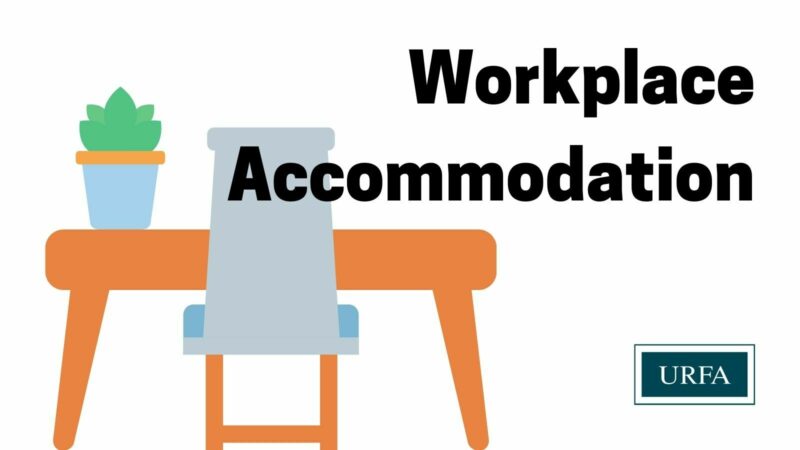Seeking a Workplace Accommodation

What is a Workplace Accommodation?
A workplace accommodation is the modification of the environment, a rule, or practice within the workplace. An accommodation can be either permanent or temporary. Examples of accommodations may include modification to job duties, work schedule and/or workload, or providing technological aids. Members should consider seeking an accommodation if they are facing barriers or challenges in the workplace. Family status accommodations and medical accommodations are options that are also available.
URFA is available to support you throughout the entire accommodation process, from gathering information and working with you and the employer to collectively and cooperatively identify an appropriate method of accommodation and follow up for any needed adjustments or changes.
What is the Duty to Accommodate?
The employer and URFA have a legal duty to make reasonable changes to your working environment if you encounter barriers or challenges in the workplace. Removing barriers or challenges becomes a legal duty if a failure to remove them could lead to discrimination. This is called the duty to accommodate. All employers have the duty to accommodate unless they can demonstrate that the accommodation would create an undue hardship for the employer.
What is Undue Hardship?
Under the Saskatchewan Human Rights Code, employers have the duty to accommodate up to the point that an accommodation would create undue hardship. An undue hardship could include a large financial cost or considerable disruption in the workplace as well as health and safety considerations. However, there is a high threshold for employers to meet their duty to accommodate, and some hardship for employers to achieve accommodation is implied in most cases.
When should I seek a Workplace Accommodation?
You should consider seeking an accommodation if you are facing barriers or challenges in your workplace due to religion, creed, marital status, family status (including a parent-child relationship), sex (including pregnancy), sexual orientation, disability (including addictions, or mental and physical health challenges), age (18 or more), colour, ancestry, nationality, place of origin, race or perceived race, receipt of public assistance, and gender identity. These are known as the “prohibited grounds” of discrimination as identified under the Saskatchewan Human Rights Code.
If you are unsure whether or not you should consider seeking an accommodation, please contact URFA. A Member Services Officer will guide you through the steps involved and will assist you throughout the accommodation process in a respectful and confidential manner.
What can URFA do to help me with requesting a Workplace Accommodation?
Assistance from URFA can be as simple as providing information on the accommodation process, or as involved as acting as your representative with Human Resources. Any assistance from URFA is always kept confidential.
URFA can help with:
- Providing confidential advice regarding your rights and responsibilities under legislation and university policies.
- Advising and providing resources to assist you throughout the accommodation process including acting as your representative when so directed.
- Accompanying and supporting you in meetings.
URFA will always maintain your confidentiality and does not take any action without your explicit direction. You will be involved throughout the entire process and URFA will not make any decisions on your behalf without your consent.
Who do I speak with about a Workplace Accommodation?
Before communicating your need for an accommodation to the employer, you are encouraged to first speak with an URFA Member Services Officer, who will go over the process with you, and explain your rights, including your right to privacy within the workplace accommodation process. You or your URFA representative must then communicate your need for an accommodation to the employer.
Contact URFA by phone at 306−585−4378, or by email at urfa@uregina.ca.
What Does an Accommodation Plan look like?
An accommodation plan will vary depending on your needs. Examples of accommodations may include modification to job duties and work schedule, changes to the work environment, or providing technological aids. Once implemented, accommodation plans should be reviewed periodically in order to determine whether any adjustments or changes are necessary. URFA is available to help and support you throughout the entire accommodation process, from gathering information and working with you and the employer to develop an accommodation plan, to implementation of the plan and any future needed adjustments or changes.
What are the University Policy and Procedures?
Workplace Accommodation policies and procedures are available online.
University of Regina, Campion and Luther:
- Policy for Workplace Accommodation for Employees with Medical Disabilities
- Procedures for Accommodating Employees with Medical Disabilities
First Nations University of Canada:
Please note that while these policies are specific to accommodating employees with medical disabilities, the Employer’s duty to accommodate applies to all of the “prohibited grounds” of discrimination as identified in the Saskatchewan Human Rights code. If you have any questions, please contact an URFA Member Services Officer.
What is the relevant Legislation?
The Duty to Accommodate is covered under the Saskatchewan Human Rights Code. More information on the Saskatchewan Human Rights Code and the duty to accommodate can be found online.
Still have questions?
Contact URFA and a Member Services Officer will be assigned to answer any questions you may have.
